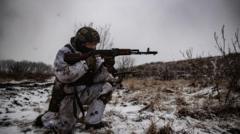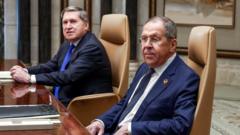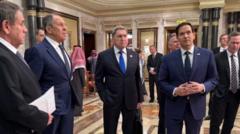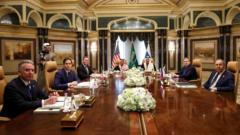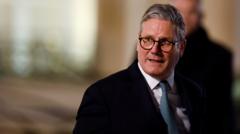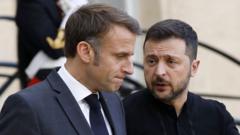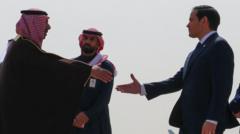The Munich Security Conference features approximately 60 world leaders discussing current threats to the international order, specifically focusing on the war in Ukraine and the evident fractures within NATO due to divergent viewpoints on how to address the conflict. The dynamics between the U.S. and European allies, alongside President Trump's controversial approaches, are key discussion points as the world faces unprecedented security challenges.
Global Leaders Gather in Munich as New Challenges Emerge for International Security
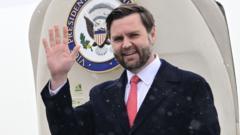
Global Leaders Gather in Munich as New Challenges Emerge for International Security
The annual Munich Security Conference sees top officials, including the U.S. Vice President and Ukraine's President, confront a shifting global security landscape amid rising tensions with Russia.
The annual Munich Security Conference (MSC) kicks off in Germany, drawing approximately 60 global leaders, including U.S. Vice President JD Vance and Ukraine's President Volodymyr Zelensky. Over the next three days, attendees will tackle pressing global security concerns, particularly in light of the ongoing conflict in Ukraine. This year’s meeting is characterized by heightened tension and uncertainty, as noted by a seasoned Western official who indicated that this is the most precarious time he has witnessed in his career.
The MSC comes against the backdrop of a questioning of the established International Rules-based Order, which many argue is already eroding. The consensus established following Russia's full-scale invasion of Ukraine seems increasingly fragile. The initial united front from NATO, the EU, and allies that emerged in response to the invasion has weakened significantly. Political shifts, especially with President Trump's recent statements regarding Ukraine, have introduced complexity into the ongoing conflict.
Trump's administration has reportedly softened its stance on Ukraine, stating that restoring pre-2014 borders may not be feasible and expressing doubts about Ukraine's aspirations to join NATO. The prospect of U.S. military support has also become murky, causing alarm among European allies who previously counted on a reliable American commitment. Recent developments, like Trump's conciliatory phone call with President Putin, further complicate the dynamics, raising concerns over NATO's cohesiveness.
As discussions unfold in Munich, various viewpoints about how best to navigate the conflict will be up for examination. Some advocates in Washington appear inclined towards a swift resolution, even if it means making concessions to Russia, contrasting sharply with European leaders who maintain that sustained pressure on Moscow is critical for a favorable outcome.
Meanwhile, NATO's foundational unity faces troubling challenges. Trump's reported desire to acquire Greenland and the subsequent threatening rhetoric toward Denmark have sent shockwaves through the alliance. Such actions raise serious questions about the viability of NATO's mutual defense commitments, traditionally viewed as sacrosanct. Observers are concerned that this shift signals a newfound acceptance of territorial threats among NATO members, which may have lasting implications for global security.
As the MSC progresses, key figures will seek to address the urgent need for a renewed commitment to international collaboration and reassess the prevailing strategies in response to these rapidly evolving geopolitical threats. The outcomes from this pivotal event may ultimately shape the future of global security dynamics for years to come.



